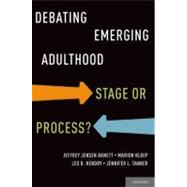
Note: Supplemental materials are not guaranteed with Rental or Used book purchases.
Purchase Benefits
What is included with this book?
| Introduction | |
| The Curtain Rises: A Brief Overview of the Book | p. 3 |
| Arguments for a Stage | |
| Presenting ôEmerging Adulthoodö: What Makes It Developmentally Distinctive? | p. 13 |
| Themes and Variations in Emerging Adulthood across Social Classes | p. 31 |
| Arguments for a Process | |
| A Systemic Approach to the Transitions to Adulthood | p. 53 |
| Lifestyles in Emerging Adulthood: Who Needs Stages Anyway? | p. 77 |
| Rejoinders | |
| Rejoinder to Chapters 2 and 3: Critical Comments on Arnett's and Tanner's Approach | p. 107 |
| In Defense of Emerging Adulthood as a Life Stage: Rejoinder to Kloep's and Hendry's Chapters 4 and 5 | p. 121 |
| Conclusion | |
| Bringing Down the Curtain | p. 135 |
| One Stage, Many Paths | p. 135 |
| What We Can Learn from Polar Bears: Changing a Stage or Staging a Change? | p. 139 |
| ôAs John McEnroe Used to Say…ö | p. 141 |
| It's Not about Winning, It's How You Play the Game | p. 147 |
| References | p. 153 |
| Index | p. 175 |
| Table of Contents provided by Ingram. All Rights Reserved. |
The New copy of this book will include any supplemental materials advertised. Please check the title of the book to determine if it should include any access cards, study guides, lab manuals, CDs, etc.
The Used, Rental and eBook copies of this book are not guaranteed to include any supplemental materials. Typically, only the book itself is included. This is true even if the title states it includes any access cards, study guides, lab manuals, CDs, etc.